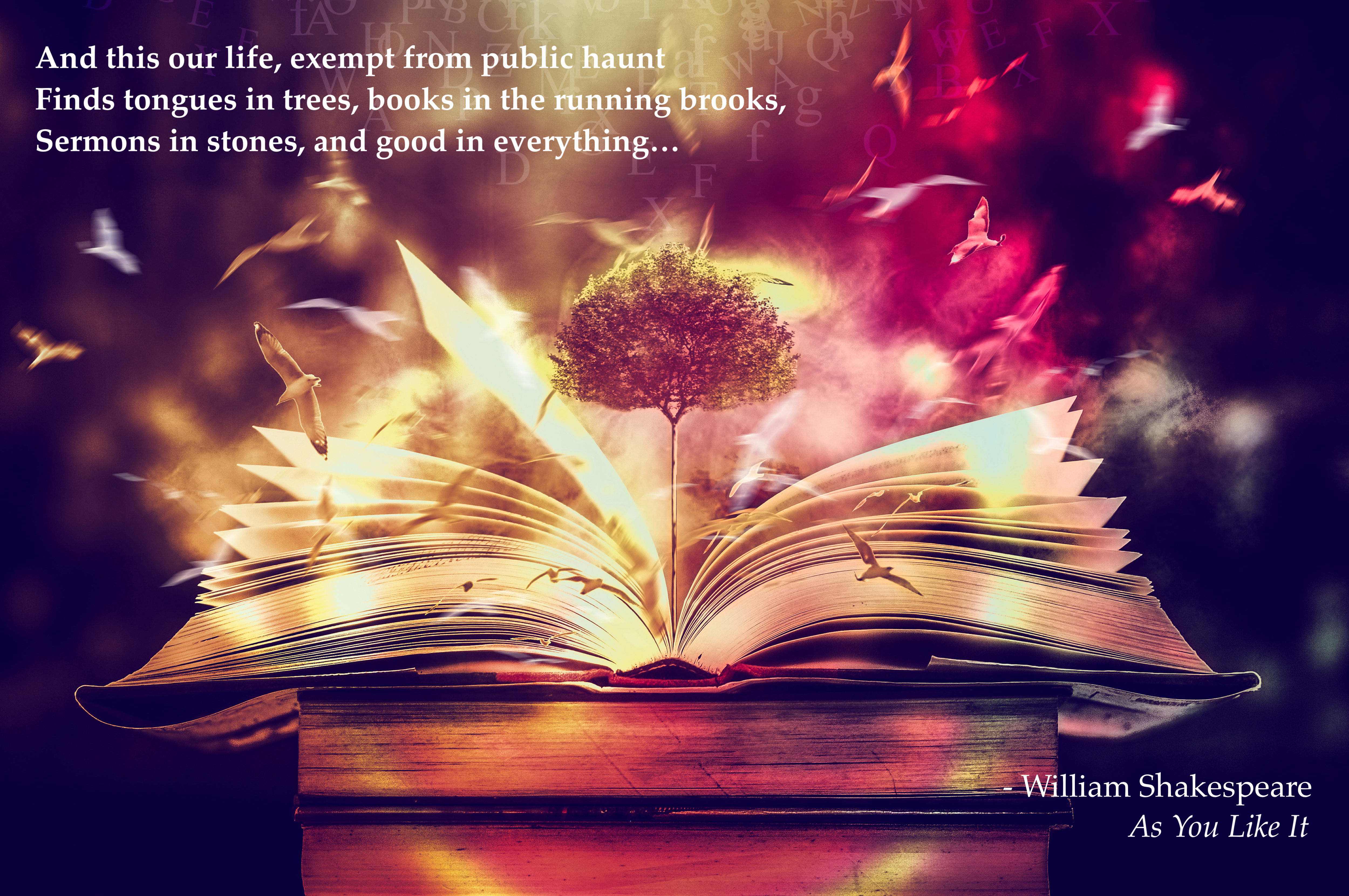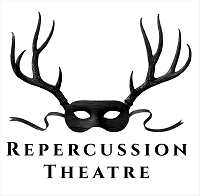

“Words, words, words.”
(Hamlet, 2.2)
| In this inaugural issue:
◊ Contemplation in/on Isolation | Musings from the AD’s Home Office
◊ “Where lies your text?” (Twelfth Night, 1.5) | Introducing Le Folio‘s New Guise
◊ A Shakespeare-Adjacent Scavenger Hunt | Chris’s Madcap Bardic Challenge
◊ “Pleasure and action make the hours seem short.” (Othello, 2.3) | Linnea’s Fun Links
As Repercussion adapts to the profoundly altered arts landscape during this time of crisis, we humbly ask that you consider becoming a monthly donor, or making a charitable contribution.
Your valued patronage enables us to keep developing new works, kickstart theatre careers, and nurture strong community connections grounded by the arts.
Thank you.

Contemplation in/on Isolation
| Musings from the AD’s Home Office
I’ve been thinking a lot about Shakespeare and the plague.
Any historical account of Elizabethan theatre or Shakespeare’s life will mention that the playhouses repeatedly faced closures due to outbreaks of the dreaded Bubonic plague. At one point, it was decreed that whenever the number of plague-related deaths rose above 30 per week, the theatres would be shut down. According to William Baker’s book William Shakespeare, the theatres were closed for a total of 78 months between the years 1603 and 1613. That’s the equivalent of 6 1/2 years. I’ve read about these instances before and have considered their likely effect on Shakespeare’s plays and his experience of the world. But I don’t think I really understood what an impact the plague might have had until now. Because of course I (like most of us) had never experienced anything like it until now. So, yeah. It’s making me think.
And given the fact that we have had to cancel our beloved summer tour, which would normally be taking up much of my brain space, not to mention having to postpone our co-production of Erin Shields’ world premiere play Thy Woman’s Weeds, I have more time to think now.
It’s a strange feeling.
Now, many have already pointed out what a generative time these plague periods proved for Will – shutdowns early in his career saw him turn to poetry (as with Venus and Adonis and The Rape of Lucrece) while, most famously, the plague of 1606 may have given him just the writing time he needed to compose King Lear. This fact has been used more than once to inspire the rest of us to quit sulking and get to work on our own masterpieces. After all, if Shakespeare wrote King Lear during a horrific plague in disease-ridden London (where they didn’t even have toilet paper to hoard) what’s my excuse?
But I’m not sure it’s useful to shame ourselves into feeling we should be unflinchingly productive during these unprecedented times. Surely even Shakespeare spent at least part of his time in quarantine just feeling kind of freaked out. Or lonely. Or afraid. Or relieved to not have to keep up with the gruelling schedule of churning out hits. As Macduff asserts in the Scottish play, after being told by the young Malcolm to accept the death of his family and deal with it like a man: “I will do so; But I must also feel it as a man.”
At Repercussion, we’re definitely feeling this whole thing (along with colleagues across the city, the province, the country, the world). There’s a sense of loss, of disappointment, of frustration and fear, and admittedly, some relief at not having to try and coordinate a theatre tour during a pandemic (at least not now). But we’re also trying to look for the unexpected sparks of inspiration that may emerge from this unique experience. We know we need to use this time to reflect and regenerate, to be thoughtful and purposeful in what we do and how, to ensure we are ready to emerge (eventually) stronger than ever.
So we may have a bit more time to think, but there’s still plenty to do. We’re working on new plays with exciting playwrights (which we’ll tell you about in the coming weeks); we plan to repair and refresh our well-worn touring equipment; we’re hoping to update our manuals, overhaul our website and come up with all kinds of innovative ways to inspire and delight you. And while I can’t promise that we’ll end up writing King Lear by the end of this thing, I can guarantee that we will do our best not to waste this extraordinary moment.

“Where lies your text?”
(Twelfth Night, 1.5)
| Introducing Le Folio‘s New Guise
This May sees the launch of a new, monthly newsletter format – in this time of upheaval, Repercussion Theatre will be keeping in closer contact with you, our cherished audiences and patrons. So, why Le Duodecimo? The short answer: we’re cheeky language nerds. More seriously, this reboot is about delivering smaller, more approachable packets of information.
A bit of history: our newsletter has previously gone by the moniker “Le Folio”, after the (still debatably) authoritative edition of the Bard’s collective works. For those that might not know, that collection, in turn, takes its name from the physical dimensions of its initial imprint – a single sheet with a single fold. But those are large sheets, with the single fold still resulting in pages that are over thirty centimetres tall – which makes for an impressive showpiece on a lectern, but is a little unwieldy.
So printers used, and use, a range of page sizes, all, originally, obtained through the meticulous folding and cutting of single sheets. Those folds and reorientations run a gamut, from the showy folio, to the more manageable (and prevalent) quarto and octavo, and (as those of you who might be good at maths might predict) the duodecimo (1). This last is a sheet folded to obtain twelve pages, and goodly sized pages at that. If the folio is a proper tome, weighty and massive as befits something like a poet’s opus, then the duodecimo is roughly analogous to a modern trade paperback (2), economical in its use of paper and ink, and compact enough to be carried with you as you go.
And therein, as they say, lies the rub – rather than produce a larger, more expansive newsletter twice annually, we’re shifting over to something that’s more compact, more approachable (3), and rolls out according to rules of twelve. (As the duodecimo is measured in twelfths of sheets, our Duodecimo will run monthly, and be issued on the twelfth of each month.) Moreover, as earlier duodecimo imprints might have asked readers to trim their own copies, and cut apart pages along the printer’s folds, Repercussion’s Duodecimo will be asking readers to have a slightly more participatory role, with streamlined snippet lead-ins, and content accessible in full by following embedded links.
Hopefully, this new format will allow us to keep in better contact with our readership, our audiences, and contribute to a meaningful sense of community – please let us know your thoughts about this shift, and happy reading!
–
Notes:
(1) Things keep going here – we can keep folding and cutting until we get the diminutive, and brilliantly named, sexagesimo-quarto.
(2) The language of printing and publishing has also provided us with a host of rich and lovely technical terms, a fair few of which have trickled down into popular usage (think of “portfolio”/”portefeuille”)…
(3) (With the possible exception of this article.)

A Shakespeare-Adjacent Scavenger Hunt
| Chris’s Madcap Bardic Challenge
Shakespeare’s works are chockablock full of imagery, metaphor, and evocative language – but they also provide clues towards some of the costuming and props work of Early Modern theatre. Here are some selected lines, that either through imagistic or literal means, mention… things!
Have a quick go about your space, challenge your family and friends (at a distance, of course) to see who can find the following objects! For a more competitive twist, impose a time-limit, or elect an arbiter and award points based on “period authenticity” and “creativity of interpretation”!
◊ “She did commend my yellow stockings of late, she did praise my leg being cross-gartered;” (Twelfth Night, 2.5)
◊ “There with fantastic garlands did she come / Of crowflowers, nettles, daisies, and long purples,” (Hamlet, 4.7)
◊ “With eyes severe and beard of formal cut, / Full of wise saws and modern instances;” (As You Like It, 2.7)
◊ “But I can give thee more: / For I will raise her statue in pure gold;” (Romeo and Juliet, 5.3)
◊ “I’ll give thee fairies to attend on thee, / And they shall fetch thee jewels from the deep, / And sing while thou on pressed flowers dost sleep;” (A Midsummer Night’s Dream, 3.1)
◊ “He hath ribbons of an the colours i’ the rainbow; points more than all the lawyers in Bohemia can learnedly handle […]” (The Winter’s Tale, 4.4)
Can you gather all six objects? Share your favourite lines, along with your corresponding finds, with us through Facebook, Instagram, and Twitter! #ShakespeareStuff

“Pleasure and action make the hours seem short.”
(Othello, 2.3)
| Linnea’s Fun Links
Drama about drama, tasty italian treats, and hip sips – check out this trio of recommendations of what to watch, eat, and drink in these interesting times.
◊ Watch: Check out Slings & Arrows, a TV series from the early 2000s about the inner workings of a Shakespeare theatre company in a fictional Canadian town. Streaming for free on CBC Gem.
◊ Eat: Italian food lovers can make Montreal restaurant Elena’s recipes at home. This downloadable mini cookbook features some of Elena’s most beloved recipes, and 100% of proceeds will go to the Montreal Restaurant Workers Relief Fund, an initiative supporting workers who have been impacted by the COVID-19 crisis.
◊ Drink: Looking for some happy hour inspiration? Try these easy 3-ingredient cocktails from the YouTube series How to Drink.


